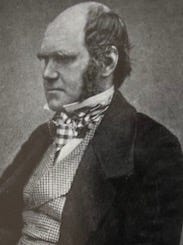By DAVID MYTON
It was the scientific discovery that shook the world of the 19th century and its aftershocks are still being felt to this day. I’m talking about evolution - that all species of life have descended over time from common ancestors.
On November 24 1859 a new book hit the shops. It was titled On the Origin of Species By Means Of Natural Selection and it went to the very heart of how we humans got here.
Its author was the mild-mannered, shy, and studious Charles Darwin, then aged 50, who for most of his adult life had pondered how we humans - and the rest of biological life - had emerged, adapted and survived.
His painstakingly-collected and compiled findings not only captured the imaginations of scientists and biologists - they also rocked the religious establishment at a time when The Bible, not the fossil record, was widely considered the primary authority on Earth’s age.
One famous conclusion by the Church of Ireland’s Archbishop James Ussher in 1664 – and believed by many at that time – was that the Earth was 6000 years old, and had been created by God at around 6pm on October 23, 4004BC.
Darwin’s findings pushed that back to a process that began millions of years ago.
On the Origin of Species arrived at a time of upheaval and huge societal, scientific and technological change, the impact of which was summarised by the poet Matthew Arnold in his 1867 poem ‘Dover Beach’. Here’s the final stanzas:
Ah, love, let us be true
To one another! for the world, which seems
To lie before us like a land of dreams,
So various, so beautiful, so new,
Hath really neither joy, nor love, nor light,
Nor certitude, nor peace, nor help for pain;
And we are here as on a darkling plain
Swept with confused alarms of struggle and flight
Where ignorant armies clash by night.
According to the University of London’s Dr Carolyn Burdette, Charles Darwin is one of the most important thinkers of modern times.He helped to transform how people thought about the natural world and humans’ place within it, she says.
So who was Charles Darwin? He was born in England into an upper middle-class family in Shrewsbury on February 12, 1809. His father, Robert, was a doctor and his mother, Susanna, the eldest daughter of Josiah Wedgwood, the renowned potter
Charles had a good school education before going on to study medicine at Edinburgh University, Scotland. He dropped out of that after a couple of years and then attended Cambridge University to study (of all things) Theology with the aim of becoming a country parson.
During this time Darwin, who already had a love for nature and the environment, became an avid collector of insects, bugs and beetles. He was fascinated by how they got to be what they were.
He was befriended by a professor of botany, the Reverend John Henslow, who impressed by Darwin’s obvious intelligence and gifts, encouraged his studies in Science as well as Classics and Mathematics.
Then in 1831 came the opportunity that would change Darwin’s life forever. He secured a place as a naturalist on a small ship based in Plymouth - the HMS Beagle - on what was supposed to be a two-year voyage but which lasted four years and nine months.
Between 1831-1836 he investigated the geology and zoology of South America, the Galapagos Islands, the Pacific Oceanic islands, and parts of Australia.
He kept diaries and notes, recorded finds, collected fossils and contemplated the amazing richness and diversity of the natural world: how did it get to be like this? he thought.
Darwin was excited and puzzled as to why there were so many different varieties of similar species, and so much evidence of species that were now extinct – so how come there was an abundance of some creatures, and a rarity of others? Why was there subtle variations between similar creatures that inhabited different places?
While aboard the Beagle, Darwin read a new book by the famous geologist Charles Lyell, The Principles Of Geology, in which Lyell demonstrated that rocks bore traces of subtle, gradual and cumulative change that took place over huge periods of time.
Darwin wondered if species could change in that time too. He had observed that Finches inhabiting the various Galapagos Islands were subtly different from each other.
He surmised that they had adapted over the generations for optimum efficiency in their various environments. These changes he termed “descent with modification” which were passed on to their offspring - in other words, this was evolution via natural selection, and it applied to all creatures.
Darwin figured out that over time and across many generations the environment eliminated some individuals, while others survived. Later generations inherited only the qualities of the survivors, and so began to resemble the survivors more than the non-survivors.
In the words of Professor David Christian in Maps Of Time: An Introduction To Big History, Darwin’s “astonishing conclusions” implied something utterly revolutionary:
“All the beautiful complex organisms on Earth, from amoeba to elephants to hummingbirds to human beings, can be created by blind repetitive processes. Unconscious processes can create not just stars and galaxies it seemed, but even life itself.”
Such reasoning seemed to deprive God Himself of any reason for existence, which is why Darwin’s theory has met – and still meets - such profound resistance.
Charles Darwin was a scientist, not an ideologue or a moralist. He went where the science took him - and he trod carefully. He was meticulous. After all, it wasn’t that long ago - in 1663 - that the renowned Galileo Galilei had been found guilty of heresy by the Inquisition for the sin of saying his new telescope proved Copernicus was right in claiming that the Sun, not the Earth, was the centre of the Universe.
As author Karen Armstrong points out, the Church did not condemn the Heliocentric Theory because it endangered belief in God, but because it contradicted the Word of God in Scripture.
And in the mid-1800s and beyond many people saw the Bible as the source of authority for more or less everything. How could Evolution possibly be right if it wasn’t mentioned in the Bible?
Darwin was very sensitive to criticism and it created much stress and conflict for him after the publication of the Origin. Being its author, Darwin often said, was almost a continuous full-time job as he sought to respond to his numerous critics.
Darwin was prepared to defend and expand the science of Evolution, but he stuck to the science and he wouldn’t go where it didn’t lead.
But such niceties didn’t stop the likes of philosopher Herbert Spencer. In 1864 Spencer twisted Darwinism to falsely explain the development of human societies through “the survival of the fittest” - the phrase I think we will all have heard - which argued that the fundamental physical laws of evolution meant that progress of any kind depended on struggle and competition.
Darwin’s book didn’t say that. But landing as it did in the mid-19th Century it was used, for a time at least, to support arguments against religion.
Philosophers piled on the criticism, with the likes of Ludwig Feuerbach arguing that God was a human projection; while Karl Marx declared religion was the “sigh of the oppressed creature” and the “Opium of the people”. In 1882 Frederick Nietzsche wrote “God’s obituary”, asserting that God was dead. Some years later the psychoanalyst Sigmund Freud said a personal God was nothing more than “an exalted father figure”.
For many religious people today, Evolution is not a problem that gets in the way of Faith; mostly it is understood that the Bible is not a scientific textbook and doesn't claim to be one. It is a book of Faith.
Charles Darwin concluded his book with these words:
“There is a grandeur in this view of life with its several powers having originally breathed by the Creator into a few forms or into one, and that whilst this planet has gone cycling on according to the fixed laws of gravity, so from so a simple beginning, endless forms most beautiful and most wonderful, have been and are being evolved.”
Darwin tended to describe himself as agnostc, not an atheist. In 1879 he wrote: “I have never been an atheist in the sense of denying the existence of God. I think that generally, and more and more so as I grow older - but not always - that agnostic would be the most correct description of my state of mind.”
REFERENCES
Karen Armstrong, A History Of God. The 4000 Year Quest Of Judaism, Christianity and Islam, Ballantine Books, New York, 1993
Matthew Arnold, Dover Beach, Poetry Foundation - https://www.poetryfoundation.org/poems/43588/dover-beach
C A Bayly, The Birth of the Modern World 1780-1914, Blackwell, 2004
John Bowlby, Charles Darwin. A Biography, Hutchinson, London, 1990
Carolyn Burdett, Darwin And The Theory Of Evolution, British Library - https://www.bl.uk/romantics-and-victorians/articles/darwin-and-the-theory-of-evolution
David Christian, Maps of Time. An Introduction To Big History, University of California Press, 2005






It’s interesting that Darwin is characterized as shy in this article: the chapter I gave a link to, above, says, in:
Subtheory 4: Natural Selection (Inbreeding)
DARWIN’S MARRIAGE:
(Paragraphs 10 & 11)
I quote: “If Darwin was not a good biologist, he was an original thinker with an encyclopedic mind. He could catalog vast groups of biological data, even if he couldn't draw correct conclusions from that data. Darwin was not afflicted with shyness as was Newton, Orville Wright, Einstein, Edison or Steinmetz. Darwin's traits rather were presumptiveness, self-assertiveness, and audacity, among others. His presumptiveness, allied with his increasing atheism and the admiration he received from others, merged into an interesting and fairly predictable complex. His uniformitarian friends began to consider Darwin as the new Copernicus of biology, and Darwin was disposed to agree with them.
He was quick to act the part and play the role to the full. He was not one to wait and check results, investigate and analyze, while others might move into this dashing role which he thoroughly anticipated. And others, including Gray, Hooker, Huxley, Lyell, Spencer, and Wallace were working with this same thesis.”
According to this book Darwin and Lyell knew each other, and designed their hypothetical models to support each other. (Wow, I guess I can’t post a screenshot … I’ll try a link to the chapter.)
The book has an extensive bibliography
Https://www.creationism.org/patten/PattenBiblFlood/PattenBiblFlood10.htm
See: 1. . Geological Catastrophism and Darwinism
Subtheory 1: Geological Uniformitarianism.
Under this subheading, the second “developed” paragraph that has the words: “Lyell's ideas relative to time were at least as poor as Ptolemy's, but Ptolemy, with his lack of data, had a better excuse for error. Darwin, who was intimately associated with Lyell for about two decades, worked as his assistant for several years following his excursion on the H.M.S. Beagle (and prior to his marriage) He was coached carefully by Lyell in uniformitarianism. It was during this era (1837-1839) that Darwin's hypothesis took its essential form.”